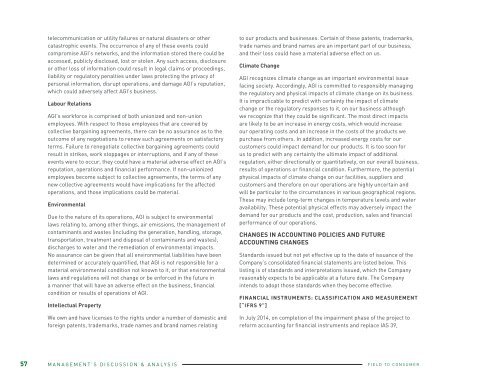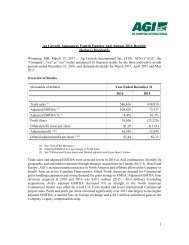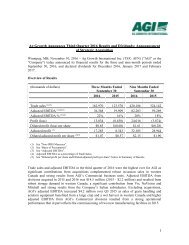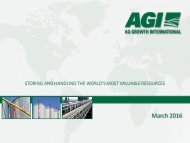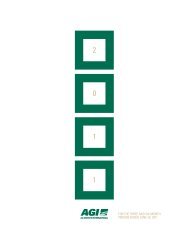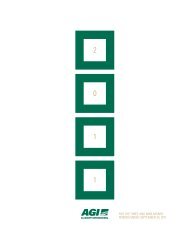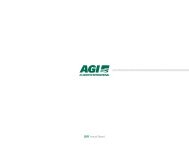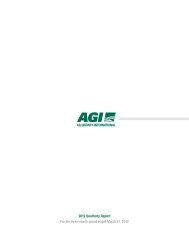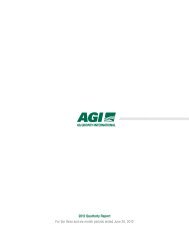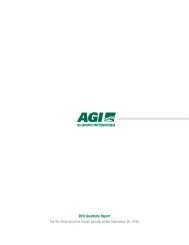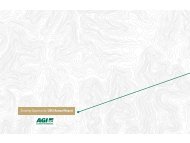2016 Annual Report For Web 7.3MB
You also want an ePaper? Increase the reach of your titles
YUMPU automatically turns print PDFs into web optimized ePapers that Google loves.
telecommunication or utility failures or natural disasters or other<br />
catastrophic events. The occurrence of any of these events could<br />
compromise AGI’s networks, and the information stored there could be<br />
accessed, publicly disclosed, lost or stolen. Any such access, disclosure<br />
or other loss of information could result in legal claims or proceedings,<br />
liability or regulatory penalties under laws protecting the privacy of<br />
personal information, disrupt operations, and damage AGI’s reputation,<br />
which could adversely affect AGI’s business.<br />
Labour Relations<br />
AGI’s workforce is comprised of both unionized and non-union<br />
employees. With respect to those employees that are covered by<br />
collective bargaining agreements, there can be no assurance as to the<br />
outcome of any negotiations to renew such agreements on satisfactory<br />
terms. Failure to renegotiate collective bargaining agreements could<br />
result in strikes, work stoppages or interruptions, and if any of these<br />
events were to occur, they could have a material adverse effect on AGI’s<br />
reputation, operations and financial performance. If non-unionized<br />
employees become subject to collective agreements, the terms of any<br />
new collective agreements would have implications for the affected<br />
operations, and those implications could be material.<br />
Environmental<br />
Due to the nature of its operations, AGI is subject to environmental<br />
laws relating to, among other things, air emissions, the management of<br />
contaminants and wastes (including the generation, handling, storage,<br />
transportation, treatment and disposal of contaminants and wastes),<br />
discharges to water and the remediation of environmental impacts.<br />
No assurance can be given that all environmental liabilities have been<br />
determined or accurately quantified, that AGI is not responsible for a<br />
material environmental condition not known to it, or that environmental<br />
laws and regulations will not change or be enforced in the future in<br />
a manner that will have an adverse effect on the business, financial<br />
condition or results of operations of AGI.<br />
Intellectual Property<br />
We own and have licenses to the rights under a number of domestic and<br />
foreign patents, trademarks, trade names and brand names relating<br />
to our products and businesses. Certain of these patents, trademarks,<br />
trade names and brand names are an important part of our business,<br />
and their loss could have a material adverse effect on us.<br />
Climate Change<br />
AGI recognizes climate change as an important environmental issue<br />
facing society. Accordingly, AGI is committed to responsibly managing<br />
the regulatory and physical impacts of climate change on its business.<br />
It is impracticable to predict with certainty the impact of climate<br />
change or the regulatory responses to it, on our business although<br />
we recognize that they could be significant. The most direct impacts<br />
are likely to be an increase in energy costs, which would increase<br />
our operating costs and an increase in the costs of the products we<br />
purchase from others. In addition, increased energy costs for our<br />
customers could impact demand for our products. It is too soon for<br />
us to predict with any certainty the ultimate impact of additional<br />
regulation, either directionally or quantitatively, on our overall business,<br />
results of operations or financial condition. Furthermore, the potential<br />
physical impacts of climate change on our facilities, suppliers and<br />
customers and therefore on our operations are highly uncertain and<br />
will be particular to the circumstances in various geographical regions.<br />
These may include long-term changes in temperature levels and water<br />
availability. These potential physical effects may adversely impact the<br />
demand for our products and the cost, production, sales and financial<br />
performance of our operations.<br />
CHANGES IN ACCOUNTING POLICIES AND FUTURE<br />
ACCOUNTING CHANGES<br />
Standards issued but not yet effective up to the date of issuance of the<br />
Company’s consolidated financial statements are listed below. This<br />
listing is of standards and interpretations issued, which the Company<br />
reasonably expects to be applicable at a future date. The Company<br />
intends to adopt those standards when they become effective.<br />
FINANCIAL INSTRUMENTS: CLASSIFICATION AND MEASUREMENT<br />
[“IFRS 9”]<br />
In July 2014, on completion of the impairment phase of the project to<br />
reform accounting for financial instruments and replace IAS 39,<br />
57 MANAGEMENT’S DISCUSSION & ANALYSIS<br />
FIELD TO CONSUMER<br />
<strong>2016</strong> ANNUAL REPORT<br />
MANAGEMENT’S DISCUSSION & ANALYSIS 58


